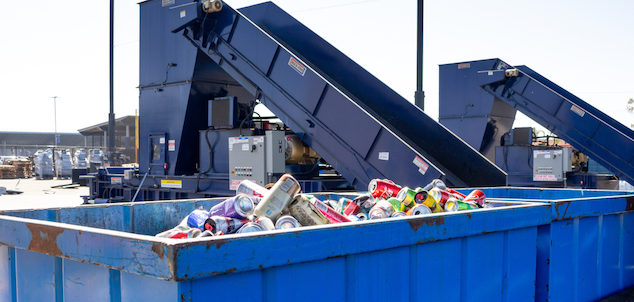Opinion
Recycling goals, leadership stymied by packaging bill
 Material collected for recycling at a facility in Costa Mesa. (Photo: TonelsonProductions, via Shutterstock)
Material collected for recycling at a facility in Costa Mesa. (Photo: TonelsonProductions, via Shutterstock)The legislation in SB 343 will lead to consumer confusion and stymie manufacturers’ efforts to recover and recycle packaging and consumer products to be used as post-consumer content in new packaging and products.
On its surface, the bill seems appropriate. Why would we want to allow recycling labels on products that will end up in landfills?
Consumers simply need direction on how and where to deal with the end-of-life packaging and product.
The problem is the packaging and products banned from including recyclability information on the label are often in fact recyclable and are being recycled in increasing quantities today based on increasing investments by manufacturers and recyclers/processors who see a need to help fill the gap with these hard and often under-recycled packaging and consumer products.
Such investments go beyond just curbside programs and include new options for manufacturer subsidized mail-back programs and retail drop off locations. To that end, just because these items may not be recycled within the current curbside construct doesn’t mean they aren’t recyclable and being recycled.
Consumers simply need direction on how and where to deal with the end-of-life packaging and product. And that’s where the bill gets really difficult and quite illogical. It also prohibits a manufacturer from providing any guidance to a consumer on its recyclability and how or where to recycle the packaging and products if the items fall outside of the stringent criteria.
The bill will actually discourage recycling in far too many instances and ignore ongoing negotiations with the manufacturing community.
This can only be seen as an attempt to either eliminate popular consumer products and needed packaging from our shelves or make manufacturers pivot their materials to something that is technologically not feasible or simply can’t be afforded in the current marketplace.
Some examples of products that can’t carry the label or provide consumer guidance are:
–Film plastics despite the fact that new, domestic in-state infrastructure has come on line to support recycling / processing of this material.
At this point the bill will actually discourage recycling in far too many instances and ignore ongoing negotiations with the manufacturing community to bring funding to the table to support the state’s focus on a circular economy.
SB 343 also creates significant costs for CalRecycle, despite the bill’s suggestion that there will be reduced costs.
According to the latest version of the bill and amid the State Department of Finance’s concerns regarding costs, CalRecycle would need to regularly update regulations, conduct characterization studies every few years on material types and forms that are collected, sorted, sold or transferred by solid waste facilities, and publish new information, all for which will cost the state and consumers more money.This bill simply works against California’s effort to provide bold leadership in the recycling space.
We are asking the legislature to amend the bill to be workable or defeat the bill now so we can get back to the negotiating table on a comprehensive solution that provides consumers with much needed education, helps manufacturers with clear pathways to be deemed “recyclable,” and provides a path for our state’s circular economy to flourish.
—
Editor’s Note: Lance Hastings is the President & CEO of the California Manufacturers & Technology Association.
Want to see more stories like this? Sign up for The Roundup, the free daily newsletter about California politics from the editors of Capitol Weekly. Stay up to date on the news you need to know.
Sign up below, then look for a confirmation email in your inbox.

Leave a Reply